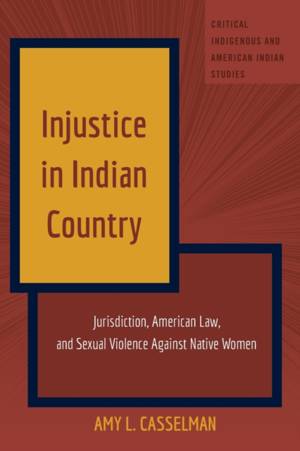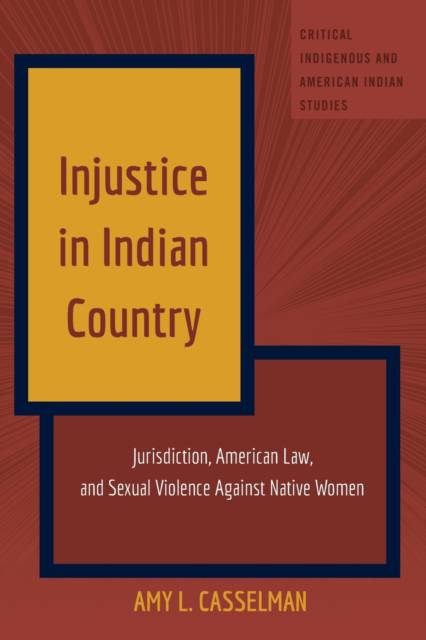
Je cadeautjes zeker op tijd in huis hebben voor de feestdagen? Kom langs in onze winkels en vind het perfecte geschenk!
- Afhalen na 1 uur in een winkel met voorraad
- Gratis thuislevering in België vanaf € 30
- Ruim aanbod met 7 miljoen producten
Je cadeautjes zeker op tijd in huis hebben voor de feestdagen? Kom langs in onze winkels en vind het perfecte geschenk!
- Afhalen na 1 uur in een winkel met voorraad
- Gratis thuislevering in België vanaf € 30
- Ruim aanbod met 7 miljoen producten
Zoeken
Injustice in Indian Country
Jurisdiction, American Law, and Sexual Violence Against Native Women
Amy L Casselman
€ 66,45
+ 132 punten
Uitvoering
Omschrijving
Living at the intersection of multiple identities in the United States can be dangerous. This is especially true for Native women who live on the more than 56 million acres that comprise America's Indian Country - the legal term for American Indian reservations and other land held in trust for Native people.
Today, due to a complicated system of criminal jurisdiction, non-Native Americans can commit crimes against American Indians in much of Indian Country with virtual impunity. This has created what some call a modern day «hunting ground» in which Native women are specifically targeted by non-Native men for sexual violence.
In this urgent and timely book, author Amy L. Casselman exposes the shameful truth of how the American government has systematically divested Native nations of the basic right to protect the people in their own communities. A problem over 200 years in the making, Casselman highlights race and gender in federal law to challenge the argument that violence against Native women in Indian country is simply collateral damage from a complex but necessary legal structure. Instead, she demonstrates that what's happening in Indian country is part of a violent colonial legacy - one that has always relied on legal and sexual violence to disempower Native communities as a whole.
Today, due to a complicated system of criminal jurisdiction, non-Native Americans can commit crimes against American Indians in much of Indian Country with virtual impunity. This has created what some call a modern day «hunting ground» in which Native women are specifically targeted by non-Native men for sexual violence.
In this urgent and timely book, author Amy L. Casselman exposes the shameful truth of how the American government has systematically divested Native nations of the basic right to protect the people in their own communities. A problem over 200 years in the making, Casselman highlights race and gender in federal law to challenge the argument that violence against Native women in Indian country is simply collateral damage from a complex but necessary legal structure. Instead, she demonstrates that what's happening in Indian country is part of a violent colonial legacy - one that has always relied on legal and sexual violence to disempower Native communities as a whole.
Specificaties
Betrokkenen
- Auteur(s):
- Uitgeverij:
Inhoud
- Aantal bladzijden:
- 154
- Taal:
- Engels
- Reeks:
- Reeksnummer:
- nr. 1
Eigenschappen
- Productcode (EAN):
- 9781433198427
- Verschijningsdatum:
- 22/08/2022
- Uitvoering:
- Paperback
- Formaat:
- Trade paperback (VS)
- Afmetingen:
- 147 mm x 224 mm
- Gewicht:
- 226 g

Alleen bij Standaard Boekhandel
+ 132 punten op je klantenkaart van Standaard Boekhandel
Beoordelingen
We publiceren alleen reviews die voldoen aan de voorwaarden voor reviews. Bekijk onze voorwaarden voor reviews.









